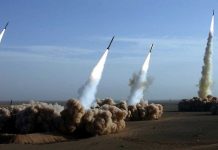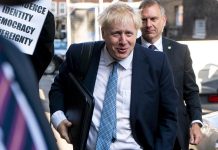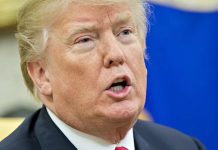The United States was considering “military response options” on Friday night after North Korea carried out its second test of an intercontinental ballistic missile in a month, with Pyongyang claiming the whole of the US was within range.
The Pentagon confirmed that the missile, which flew for 45 minutes, travelled an estimated 600 miles and landed west of Japan’s Hokkaido island, was an ICBM. It flew for six minutes longer than the previous one, on July 4.
“The test-fire reconfirmed the reliability of the ICBM system, demonstrated the capability of making a surprise launch of the ICBM in any region and place any time, and clearly proved that the whole U.S. mainland is in the firing range of the DPRK (North Korea) ,” KCNA, Pyongyang’s official news agency, said.
Washington, which has branded North Korea the “most urgent and dangerous threat to peace,” condemned the launch as reckless.
“By threatening the world, these weapons and tests further isolate North Korea, weaken its economy, and deprive its people,” Donald Trump said in a statement.
“The United States will take all necessary steps to ensure the security of the American homeland and protect our allies in the region.”
As Pyongyang confirmed the launch, South Korea said it was ready to take its own steps to deal with the threat.
Song Young-moo, South Korea’s defence minister, said Seoul would prepare independent measures..
“Along with joint efforts to deter proliferation (of North Korea’s nuclear threat) we will prepare independent measure to curb it as soon as possible,” Song told a press conference in Seoul, just minutes after Pyongyang said its second missile test was meant as a “stern warning” for the United States.
The launch was also condemned by the Chinese foreign ministry.
“China opposes North Korea’s violations of UN Security Council resolutions … At the same time, (China) hopes that all parties concerned will exercise caution and avoid intensifying tensions” on the Korean peninsula, a foreign ministry spokesman said.
Experts said the North’s ICBM launched on Friday was capable of striking Los Angeles and other U.S. cities – a similar assertion was made by KCNA, the official North Korean news agency.
The United States and South Korea responded to the missile test by staging a joint missile exercise.
Shinzo Abe, Japan’s prime minister, has called a meeting of the national security council to assess the launch.
“I have received the first report that North Korea again launched a missile and it possibly landed inside the exclusive economic zone,” said Mr Abe.
He called the launch “a serious and real threat”, while Yoshihide Suga, Japan’s government spokesman, said: “North Korea’s repeated provocative acts absolutely cannot be accepted.”
US and South Korean military officials were discussing military options last night.
Marine General Joseph Dunford was joined by the Admiral Harry Harris, Commander of US Pacific Command, when they called General Lee Sun-jin, chairman of the South Korean Joint Chief of Staff.
“During the call Dunford and Harris expressed the ironclad commitment to the US-Republic of Korea alliance. The three leaders also discussed military response options,” said Captain Greg Hicks, a spokesman for Gen Dunford.
While the Pentagon has long planned for the possibility of conflict with North Korea, the blunt language in the statement marked a departure from previous public reactions to missile tests.
The Pentagon, which earlier this week warned that North Korea could have a nuclear-enabled ICBM as early as next year, said it detected the launch almost immediately.
Donald Trump’s administration has said that the period of ‘strategic patience’ towards North Korea is over,
US officials have also expressed growing frustration with Beijing for not doing more to pressure its neighbour to rein in its military ambitions.
Britain and Australia this week joined the US in calling for China to exert more pressure on Pyongyang.
However, China says it has little leverage over leaders in Pyongyang, and regularly calls on the US and South Korea to halt military drills in the region as a means of diffusing tensions.
Reports this week suggest that Beijing is preparing for a potential crisis along its shared border with North Korea by building bunkers for civilians and realigning forces in the region.
The US and China earlier this week said they are making progress on a new UN resolution that would impose additional sanctions against North Korea in response to the ICBM launch.
The rogue state is already under tough UN sanctions which have been enforced since it carried out its first of five nuclear tests in 2006.
-Telegraph.co.uk








